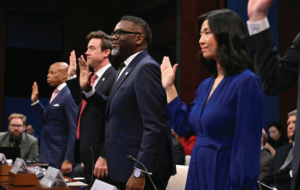Tensions Rise in Controversial Edward Gallagher Case
Presidential Pardon of Navy SEAL Illustrates Trump’s Abuse of Executive Power
Trump has reversed the Navy’s ruling that former Navy SEAL Edward Gallagher is guilty of misconduct.
December 23, 2019
This past November, Edward Gallagher was tried and convicted for misconduct, which resulted in his demotion from the coveted position as a Navy SEAL. In 2017, on a deployment in Iraq, Gallagher was accused of brutally murdering a teenage prisoner of war and taking a picture with the body afterward. After the accusation was reported to Navy officers, Gallagher was tried on counts of murder and misconduct.
In a military trial, anything a witness says cannot be held against them, and one of Gallagher’s witnesses confessed to the murder. Regardless of the confession, the court still found Gallagher guilty for misconduct, and ruled to strip him of his Navy SEAL status. But following the court decision, President Trump reversed the Navy’s ruling, reinstating Gallagher as a SEAL. The reversal against official court proceedings proved Trump’s misuse of power and ultimate misdemeanor while in office.
Although Trump has the legal power to pardon Gallagher, his actions have a dangerous effect on the relationship between the presidency and the military. In the past, the president’s power to challenge military decisions has not been tested because the trust between the Army and the President has previously been upheld.
The president’s ability to interfere in military proceedings is not explicitly stated in the Constitution, and the issue has not been investigated by the Supreme Court because it has been rare for past presidents to disrupt the Army’s decisions. The pardon now begs the question of how much power the president truly has, and what Congress can do to regulate it.
Congress has the power to limit the president’s ability to pardon freely, although it may not be in their best interest to do so. If the legislative branch oversteps its role in regulating the executive branch, the system of checks and balances could be thrown off. In this instance, though, Congress must intervene because by not treating the military with autonomy, Trump is demonstrating his inability to lead effectively.
As the Commander in Chief of the military, President Trump has a responsibility to respect the decisions of those under his command, especially those in the military. Pardoning Gallagher shows that Trump does not trust the Navy’s leaders. By publicly condemning and reversing the ruling of the military court, Trump is straining his relationship with the Navy commanders, increasing the likelihood of a distrustful relationship between Trump and the US military. A fragile relationship between the two not only worsens communication among military leaders, but jeopardizes the safety and security of the American people. As the impeachment investigations continue, Trump cannot afford another scandal. His behavior towards Gallagher and military proceedings have only further proved his inefficacy as President. The Gallagher case is an example of Trump putting personal beliefs above the rulings of the court, proving that he believes he is above the law. President Trump has repeatedly shown his misconduct in the oval office, and this case confirms that he is not fit to serve.
This piece also appears in our December 2o19 print edition.











